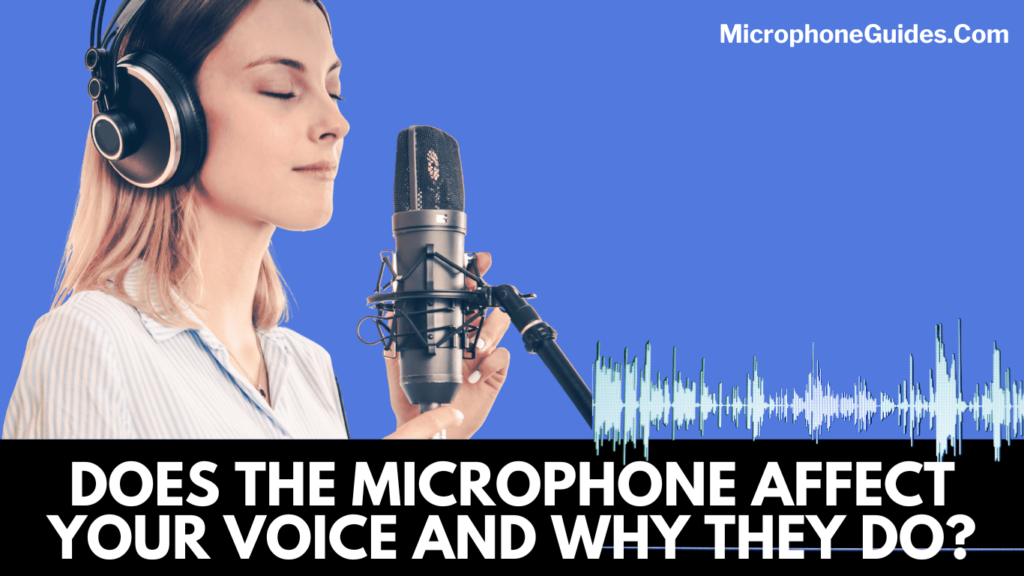Remember how delighted you were when you bought an Android phone for the first time? Like everyone else, you tried every feature eagerly.
From changing your phone password to applying application lock, you did everything in the excitement and warmth of that moment. Didn’t you?
Agree?
Whenever you play your voice recording, you must get confused about the voice. At one point or another, you feel like do you sound like this in real life? Or does microphone affect your voice?
We are here to clear out your confusion. Yes, we are here to help you out in knowing the truth behind your voice in any sound recording.

Let’s embark on our writing!
Does Microphone Change Your Voice?
Let me tell you a twofold secret that says you don’t get to hear your natural voice no matter how much you try to hear it, and microphones embellish your voice a little more. Got the point?
Okay, let me explain.
What sound you hear of yourself is far different from your actual voice, and microphones make it even more different.
To this point, we came to know that microphones do change our voices. But how does it do that? This is a question to ponder. And to know that, you need to glue your eyes on the upcoming paragraph, which is all about the mechanism by which microphones alter your voice.
How Does Microphone Change Your Original Voice?
A bunch of factors are responsible for voice alteration in a microphone. Some of the most common factors are discussed next;
- Polar Patterns
Different microphones have different pathways that they follow to capture audio signals. These signals play a significant role in causing alteration of voice.
For instance, a condenser microphone with an omnidirectional pattern will welcome audio signals from all directions, and that is why they would be more sensitive to any change in the background.
On the other hand, a unidirectional mic will facilitate audio signals coming from one direction only and will dismiss audio signals from other directions. As per microphones with cardioid patterns are concerned, they welcome maximum audio signals from the front, some signals from either side, and dismiss almost all the audio signals from the back.
All the polar patterns mentioned above change your voice in one way or the other. For instance, omnidirectional microphones add irrelevant noise to your voice.
- Distance from the Microphone Capsule
The distance of any microphone from your mouth decides great things about the quality of sound it will produce. The greater the distance, the more the difference in your sound.
For instance, if you are standing 10 to 15 inches away while talking into a microphone, your voice will come in a low tone, and it would appear as if someone has secretly recorded your voice and you were not willing to record that.
One thing to note is dynamic mics are much less sensitive to such a distance. All types of Condenser microphones show sensitivity to any sound signal that exists anywhere around the microphone.
- Effect of Air Pressure
If you have studied biology or human physiology in your college days, you would know that the inner ear is responsible for making us hear the sound more clearly.
In day-to-day conversations, whenever we talk, we are communicating directly with a person. It means that sound waves have to pass through a little distance to reach the inner ear of the opposite party. And that is why your original voice is not altered completely.
Contrary to that, whenever you speak into a microphone, your voice needs much more time to reach out to the inner ear of the audience. While covering that distance, the frequency, and pitch of your voice change, and that is why you hear a completely different voice in recordings.
Frequently Asked Questions About Alteration of Voice When Using Microphones
- Which microphone should I consider for a deeper voice?
One of the most popular types of condenser microphones, called the ribbon microphone, is best for recording deeper voices. These microphones alter your voice in the best way and are best known for their accuracy and resilience.
- Which microphone is best for getting natural sound?
Dynamic microphones can work in your favor if you want to get a natural voice. Here it is important to note that dynamic mics do produce ‘self-noise,’ and do ‘alter’ your voice, but the effect is much lesser than other types of microphones.
- Which microphone should you use if you want to sound better?
Well, any good-quality microphone will work for you if you want to sound better. But for more professional events, it is highly recommended to use condenser microphones. This is because condenser microphones are a little more sensitive to both high and low-frequency sounds.
- Why do most people not like their voices in recordings?
There could be a bunch of reasons for that. For example, most people don’t like their voice in recordings because of the changed pitch and frequency. Others don’t like the depth of voice in recordings. Interestingly, most people have a psychological problem called ‘voice confrontation’. It is a situation in which a person never likes his voice in real life or in recordings.
Final Statement
We don’t sound exactly what we hear in voice recordings. Yes, this is the truth. Microphones alter your voice because of different factors. Most of the time, it makes you sound better in a recording. However, it does make you sound annoying in a voice recording. It has that power too. This article has discussed three major factors that lead to the alteration of voice whenever you speak into a microphone. Hopefully, it will help you out!
William Souza Here, I Am Sound Specialist, Have Trained Many Musicians And Singers. I Write Blog Contents About Sound, Music, Microphone Reviews, Speaker Reviews, Sound Card Reviews And All About Sound/Music Reviews And Instruction. I Am Writing On This Blog MicrophoneGuides.com As On My Experience And Will Update More Information & Review About Different Microphones For Different Users.









